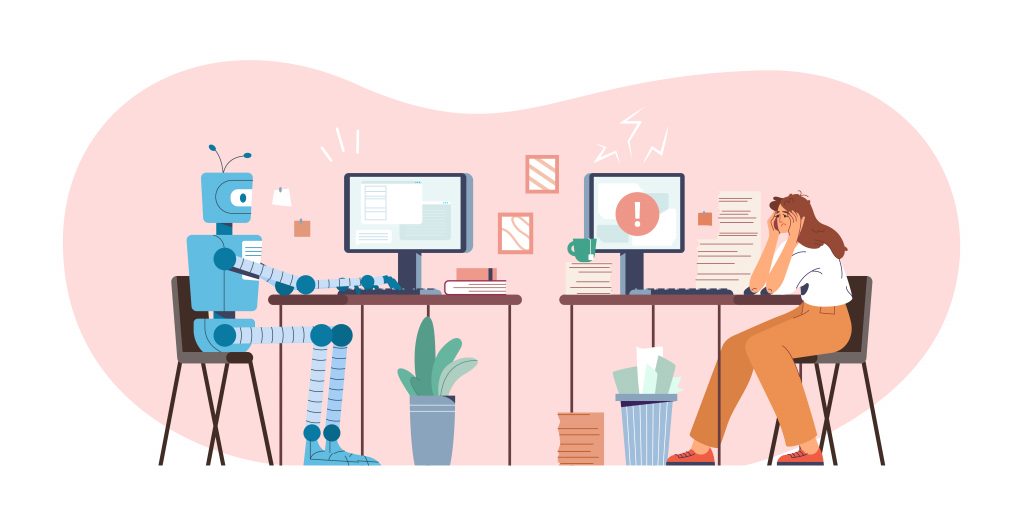As I studied history, I’ve often felt a tinge of envy for those who lived during the Renaissance period. Just imagine being a contemporary of visionaries like Leonardo da Vinci, Copernicus, and Gutenberg and witnessing the epochal shift to the heliocentric model, the advent of the printing press that ushered in an overflow of information and ideas, and the astounding advances in medicine and the arts. It was a truly remarkable time to have been alive.

Image by redgreystock
But hold on – doesn’t this sense of wonder and excitement sound a bit familiar? If the cyclical nature of history is to be trusted, then we are currently living through a new Renaissance, but this time it’s on steroids. And we are hurtling towards a new era of Enlightenment at a speed that would make a warp drive blush.
What used to take centuries to develop is now happening in a matter of months, thanks to modern-day technology, science, and art pushing the boundaries of what was previously thought possible.
The Renaissance was a time when human potential and individual creativity were celebrated. Today, we’re experiencing a similar shift in how we think about the capabilities of machines and their potential to augment or replace human intelligence (at least some aspects of it).
Now, we’re at another level of a game that humanity played before – the impact of automation on the job market. With the rise of artificial intelligence and automation, more and more tasks are becoming automated, leaving people to think about how they can remain competitive in the face of these technological advances.
The future of work is changing rapidly. Generative AIs, like OpenAI’s GPT models, are transforming the way we work today, with the potential to replace human workers in some fields. As an employer, if you have the option to delegate some tasks to AI, why would you need a human worker? Generative models can work 24/7, perform a wide range of tasks (including content generation, administrative work, and writing simple code and architecture), and don’t require social packages.
So what does this mean for the future of work? Artificial intelligence and automation are already changing the job market, and it’s more important than ever for people to think about how to remain competitive in the face of these technological advances. As more and more tasks become automated, people will need to focus on developing and highlighting skills that can’t be replicated by machines (at least not yet).
Practical Tips for Competing in an AI-Driven Job Market
Are you feeling uncertain about the impact of AI and automation on the job market? Don’t worry. With the right skills and mindset, you can stay ahead of the curve and thrive in the changing workforce. Here are some practical tips for job seekers:
- Highlight your unique human qualities. Artificial intelligence and automation may be able to perform many tasks, but they lack the empathy, creativity, and critical thinking skills that humans possess. Showcase your soft skills in your resume and job interviews to stand out from the competition. Think about your experience in collaboration, working with cross-functional teams, understanding human needs and developing user-friendly solutions while meeting requirements. As a software developer, you can also highlight your ability to communicate technical concepts to non-technical stakeholders, as well as your ability to see the bigger picture beyond the code.
- Demonstrate your adaptability and willingness to learn. In a rapidly evolving job market, the ability to quickly adapt and learn new skills is crucial. Highlight your experiences where you’ve had to adjust to new situations or learn technologies and show your openness to expanding your skill set. For example, talk about a time when you had to learn a new programming language or technology stack to complete a project successfully. You could also show your willingness to collaborate and share knowledge by mentioning how you helped a colleague learn a new skill or adapted to a new team dynamic.
- Focus on high-level skills and strategic thinking. As artificial intelligence and automation take on routine tasks, it’s essential to focus on high-level skills and strategic thinking to remain competitive. Emphasise your experience in complex problem-solving, critical thinking, and developing and executing strategic plans. Think about times you improved the scalability, reliability, and performance of the software product or how you tackled complex technical challenges that required innovative thinking. Or when you implemented a new technology or process that had a positive impact on the business.
- Consider upskilling or reskilling. With artificial intelligence and automation advancing, some jobs will become obsolete while others will require new or different skill sets. Consider upskilling or reskilling to stay competitive and open up new job opportunities. Look for courses or programs that teach skills in emerging fields like AI, machine learning, and data analytics. Also, stay informed about the latest trends and developments in your industry by reading relevant publications and attending industry events.
- Network and stay informed. Network with professionals in your field, attend industry events and webinars, and keep up with the latest news and developments to identify emerging job opportunities and make valuable connections. By networking, you can also learn about new technologies or approaches that you can use to improve your skills and productivity.
- Embrace AI tools to boost productivity. With artificial intelligence and automation creating new jobs, gaining experience with these tools can be a valuable asset. Research and familiarise yourself with artificial intelligence technologies that can be used in your field to make your work more productive. For instance, you could explore tools for automating testing, optimising code, or analysing data to identify patterns and insights. By showing that you’re comfortable using AI and automation tools, you can demonstrate your willingness to embrace new technologies and ways of working. Highlight your experience in using such tools to complete tasks efficiently and effectively (with numbers!).
Share your thoughts in the comments and let us know how you’re preparing for the changing workforce! 👨💻👩💻🤖